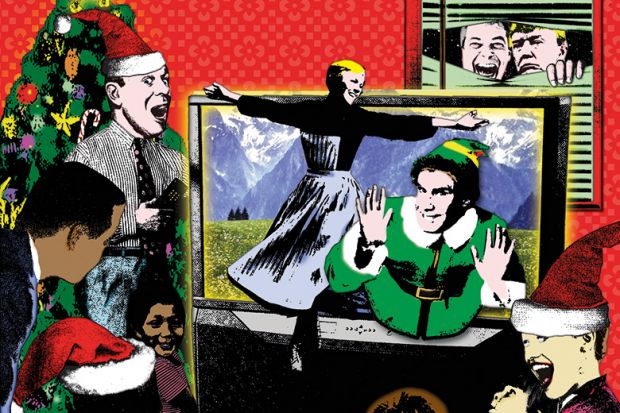It has been a truly bruising year for liberalism and higher education. But now it is Christmas: a time for passing around the mince pies and feeling goodwill to all as we gather to watch yet another festive family film. And while we do that, perhaps we can rediscover our passion for resolving differences and find some way we might all move beyond the fraught schisms of the past 12 months.
The transcendental charm of the Christmas film has helped to paper over many a crack in familial relations. It has built bridges over the tops of fortified walls and erased stubborn borders. So, in this TV-on-demand era, which of the perennial Yuletide offerings might best offer an antidote to the current landscape of post-truth cynicism and fractured loyalties?
The Sound of Music (1965) is a serious contender. While it remains the most un-Christmassy of all Christmas films (it is set in spring and explores the early exit of a nun from a convent), for many families Christmas would not be Christmas without Julie Andrews humanising lonely widower Christopher Plummer.
Like many other Christmas films, The Sound of Music is really about the outsider – in this case, Andrews’ Maria, a stranger who comes into the midst of the von Trapp family to share her soft skills of singing, dancing and sewing. Although Captain von Trapp is initially hostile to her, he is gradually seduced by her magnetism and by the sheer beauty of hearing his children sing. The family ultimately become refugees, who flee across Europe to avoid living under the incoming Nazi regime.
So you have bullying patriarchs, refugees and the fascistic closing of national borders: how much more topical could The Sound of Music be? If anything could melt the alt‑right heart, it is surely this.
Christmas is often a time when neighbours become more neighbourly. They exchange cards and presents, and may even drop in on each other to share a seasonal beverage. In a year when political events in the US and the UK have seriously threatened community cohesion, such neighbourly bridge-building needs to be encouraged more than ever. The French philosopher Emmanuel Levinas famously invoked the figure of “the Neighbour” in his work on ethics, arguing that seeing the face of “the Other” – who might be your neighbour – comprises an ethical act of humanity. This is in stark contrast to the view of Slavoj Žižek, who flippantly suggests “smashing the Neighbour’s face” in his critique of Levinas, which sees justice and love as definitively incompatible.
These opposing views bring two Christmas films quickly to mind. It’s a Wonderful Life (1946) clearly offers Levinas-inspired hope, erupting out of the small-mindedness of the Potterville community. On the other hand, Deck the Halls (2006) sees Danny DeVito and Matthew Broderick as two Žižek-like warring neighbours going head-to-head over their personal right to stage Christmas in the way they see fit.
Taken to its logical conclusion, the current Trump-infused political landscape might best be reflected by Billy Bob Thornton’s Bad Santa (2003) – or even the recently released Bad Santa 2 – in which the spirit of Christmas is threatened by avarice, profanity and the objectification of women. But it is doubtful that either of the Santas will enter the Christmas canon in quite the way The Sound of Music and It’s a Wonderful Life have done, by offering more optimistic views of a future based on civic and democratic values.
But we can do even better than these two. The film that, to me, feels most right for 2016 is another timeless classic. Elf (2003) sees orphan Buddy growing up in the North Pole, working as an elf for Santa despite being distinctly Other because of his immense size and lack of elfin features. The film documents his quest to find his real father, which involves his getting a job in the toy department of a Manhattan department store, causing consternation among customers and co-workers alike.
Buddy’s boundless joy and universal optimism feeds into a secular notion of Christmas that celebrates the simple pleasures of crafting paper snowflakes, singing seasonal songs and giving presents. His absolute belief in the magic of Christmas, complete with its flying, time-distorting reindeer, presents an authentic riposte to the cynical world of business personified by his belligerent and child-denying father. The film evokes a mindset in which anything is possible – where even Donald Trump himself could become infected by the Christmas spirit and choose to share his wealth and make everyone who is different feel valued and loved.
Elf might well be the best Christmas movie ever made. And watching it this holiday season is by far the best response to any enduring pessimism you might have about the year ahead.
Mark O’Thomas is professor of theatre and performance at Newcastle University.
POSTSCRIPT:
Print headline: Light amid the darkness
Register to continue
Why register?
- Registration is free and only takes a moment
- Once registered, you can read 3 articles a month
- Sign up for our newsletter
Subscribe
Or subscribe for unlimited access to:
- Unlimited access to news, views, insights & reviews
- Digital editions
- Digital access to THE’s university and college rankings analysis
Already registered or a current subscriber? Login






